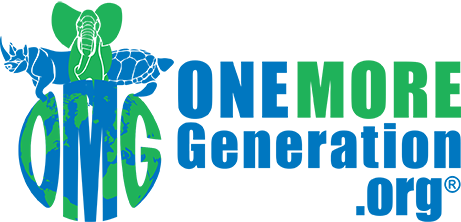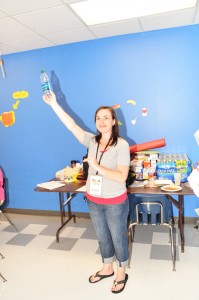OMG Hosts Educational Program at the First United Methodist Church VBS Summer Camp
“This amazing piece of art was created for OMG by a very talented local artist Jenna Gridley”
Olivia and Carter were recently invited to teach their Plastic Awareness program to the kids attending this years VBS classes at the Fayetteville First United Methodist Church in Fayetteville GA. Pastor Kristen Heiden and her amazing staff and volunteers host probably one of the areas most popular VBS summer camps. This year our two young founders were invited to share their Plastic Awareness program to all the attending students.
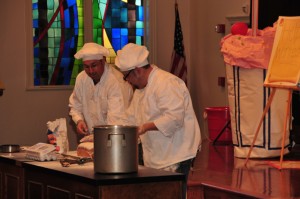 The staff and church families involved with creating the theme for each years VBS program continue to outdo themselves and this year was no different. This year they cooked up a special program designed to create awareness about the importance for us all to trust what God has in store for us. Olivia and Carter’s Plastic Awareness program is also designed to remind everyone that we are all responsible for taking care of God’s creations. Teaching kids at an early age the importance of living sustainably is crucial to correcting the current environmental issues we face pertaining to plastic pollution.
The staff and church families involved with creating the theme for each years VBS program continue to outdo themselves and this year was no different. This year they cooked up a special program designed to create awareness about the importance for us all to trust what God has in store for us. Olivia and Carter’s Plastic Awareness program is also designed to remind everyone that we are all responsible for taking care of God’s creations. Teaching kids at an early age the importance of living sustainably is crucial to correcting the current environmental issues we face pertaining to plastic pollution.
At this years VBS program we had the opportunity to meet all the students over the course of several days. The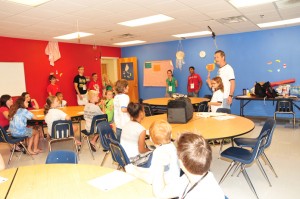 classes were broken down into smaller groups based on age and our program was tailored to accommodate their comprehension levels to the issue of plastic pollution. The students were given the opportunity to express their understanding of the issue and asked to tell us why they felt it was important for each of them to lend a helping hand.
classes were broken down into smaller groups based on age and our program was tailored to accommodate their comprehension levels to the issue of plastic pollution. The students were given the opportunity to express their understanding of the issue and asked to tell us why they felt it was important for each of them to lend a helping hand.
I just love teaching to children in these age groups. Their comments are always so sincere and honest. Each one of them told us that they understood our role with regards to looking after God’s creations. They all knew that God placed all the animals on this planet for a reason and that it was up to us to ensure we looked out after them and that we watched out to see that each animal had a clean place to live.
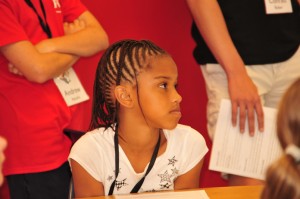 As we progressed though our program, it was obvious that the children had no ideas as to how severe the issue of Plastic Pollution had become, nor did they even know about the devastating affects our trash has on the many animals.
As we progressed though our program, it was obvious that the children had no ideas as to how severe the issue of Plastic Pollution had become, nor did they even know about the devastating affects our trash has on the many animals.
It is estimated that over 1-million Sea birds and over 100,000 Marine mammals die each year from ingesting plastic.
Part of our program was designed to help each child better understand the Recycle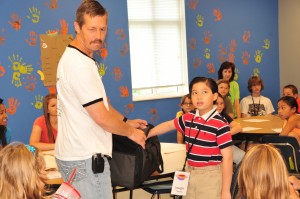 Numbers and what they mean. We brought along a travel bag full of plastic trash items which practically every family discards each day. We told the students we had brought them something special and asked that each one step forward to with their eyes closed, pick out something special.
Numbers and what they mean. We brought along a travel bag full of plastic trash items which practically every family discards each day. We told the students we had brought them something special and asked that each one step forward to with their eyes closed, pick out something special.
It was fun to watch how their expressions of excitement quickly turned to an expression of confusion as they realized the item they pulled out of the bags was nothing more than household plastic trash. Once everyone had picked a piece of trash, we showed them where to find the ‘Recycle’ symbol and then helped then understand what each of the seven numbers mean.
We then told them which items were readily accepted by local recycle centers and which ones were deemed less favorable and usually end up in our land fills. They learned that plastic #1 which is mainly used to make clear bottles such as your standard water bottles is a plastic which is actually porous, which means that germs and bacteria can collect in the plastic and these types of plastic should never be re-used. They are perfectly fine for recycling but is strongly recommended that you do not keep refilling the bottles for that reason.
The unfortunate fact about most water bottle manufacturers is that they prefer to use 100% virgin plastic pellets (or nurdles as they are called) to make their bottles as opposed to using recycled plastic. That means we are left with millions of water bottles which end up not being recycled. Instead these bottles are typically shipped in big container ships back to places like China and India. It is actually cheaper for recycle centers to ship the bottles to the far east in stead of shipping the same items across the US.
We also spent a good portion of our time with the children to help them understand
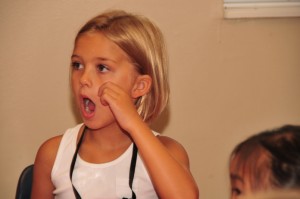
The look of disbelief from the children as they learn what plastic trash does to animals is always the same
the affects of all our plastic trash which ends up in our oceans. Most people do not realize that virtually every piece of plastic ever created is still on our planet. The bad part of plastic is that it never goes away. Plastic in our landfills stays there without breaking down for hundreds of years. Plastic that ends up in our oceans does eventually break down into smaller pieces but it also never goes away. It just breaks down to smaller pieces which are easier for fish, sea birds and other marine mammals to eat.
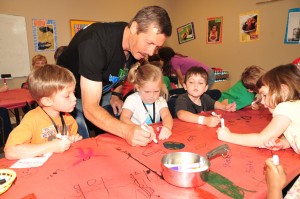 As we worked with the younger students, we allowed them to express their thoughts about the importance of us all getting involved with trying to save all the animals affected, by drawing pictures of their favorite animal. The kids are so creative and their hearts are so sincere. We always love seeing what they create and what their message is that they have for adults.
As we worked with the younger students, we allowed them to express their thoughts about the importance of us all getting involved with trying to save all the animals affected, by drawing pictures of their favorite animal. The kids are so creative and their hearts are so sincere. We always love seeing what they create and what their message is that they have for adults.
During our time teaching the VBS students, we had such a great time and although we are invited to do the teaching, we invariably walk away having learned something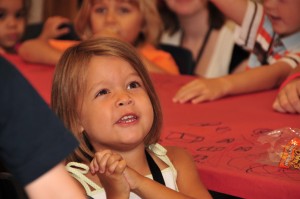 ourselves. I always make it a point to ask Olivia and Carter what they learned from the kids they met and it never fails, each time they point out something unique or special that they took away from their experience. This time Olivia’s take-a-way was that she noticed that kids even younger than her kept coming up to her and telling her that they were going to go home and tell their mommy’s that not recycling is bad for animals. Carter was struck by the large numbers of kids who came up to him and said they too were going to start to get involved by asking their teachers at school to help them set up a recycling station.
ourselves. I always make it a point to ask Olivia and Carter what they learned from the kids they met and it never fails, each time they point out something unique or special that they took away from their experience. This time Olivia’s take-a-way was that she noticed that kids even younger than her kept coming up to her and telling her that they were going to go home and tell their mommy’s that not recycling is bad for animals. Carter was struck by the large numbers of kids who came up to him and said they too were going to start to get involved by asking their teachers at school to help them set up a recycling station.
We started OMG to help save endangered species. As we progressed, we learned that we would only be spinning our wheels if we didn’t also include some sort of 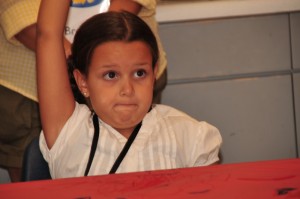 environmental component to our program since how we treat our planet also directly affects every living species. We are very proud of all the work Olivia and Carter have been doing, but the number one message we have for kids worldwide is the “Anybody Can Make A Difference, If We Can… You Can Too”. Seeing kids raise their hands with suggestions of what can be done to change the situation and hearing comments like we did after this program proves our message is being heard.
environmental component to our program since how we treat our planet also directly affects every living species. We are very proud of all the work Olivia and Carter have been doing, but the number one message we have for kids worldwide is the “Anybody Can Make A Difference, If We Can… You Can Too”. Seeing kids raise their hands with suggestions of what can be done to change the situation and hearing comments like we did after this program proves our message is being heard.
If you have a group of students that could benefit from any of our programs, give us a call, we would love to come out and help inspire them as well.
BTW, we posted all the photos we took at the event and placed them on in an album on our FaceBook page. Check them out and let us know what you think.
From all of us at OMG, thanks for caring 😉
